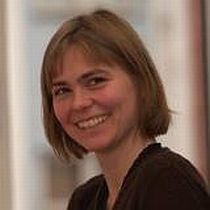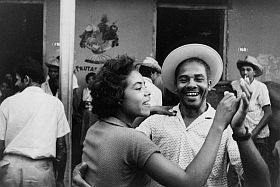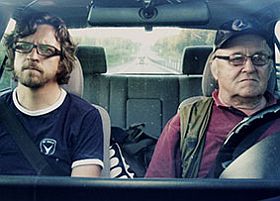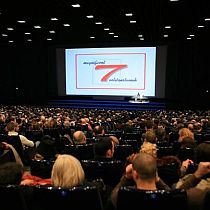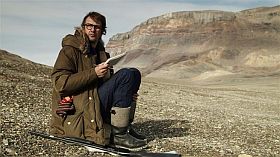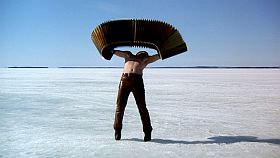Jeg er, når jeg læser foromtalerne og i og med selve titlen og, da det kommer dertil, fra filmens begyndelse midt i de store arktiske ekspeditioners omfattende mytologi. I mit liv begyndte den mytologi naturligvis med Knud Rasmussens store slæderejse, og den fortsatte med min generations ekspeditionsdeltagere og deres fascinationer af de gamle (selv har jeg aldrig rejst), som da Per Kirkeby i sin tid skrev om nye biografiske bøger om ”… helte fra et af mine reservater, Mylius-Erichsen og Lauge Koch. For at mit polarrejsende-Valhalla skal være besat på de første rækker mangler nu blot J.P. Koch, Nansen, Wegener og Eigil Knuth.” Der står altså en del biografier af den slags i Kirkebys reol, og jeg har ikke svært ved at gætte en stor del af de biograferedes navne. Disse klipper af mænd var også mine helte og deres fortællinger var min udfordring. Og der troede jeg altså, at jeg kunne begynde at se Denciks film.
Eller jeg kunne begynde med Daniel Richter, som medvirker i filmen som ekspeditionsdeltager, og som sidder der på den grønlandske klippe med skitseblok og riffel, jeg kunne begynde med hans malerier, for det hedder om hans landskaber i en tekst fra en udstilling, jeg så, at de ”… forbinder sig med romantikkens landskabsmaleri og oversætter på kyndig vis det ophøjede romantiske til et tidssvarende sprog.” Disse bjerge af på én gang destruktion og evighed omkring små skikkelser af foreløbighed i undfangelsens længsel. Der så jeg i begyndelsen af Denciks film, at jeg måske kunne fortsætte i en forståelse af hans landskaber af hav og is og klippe.
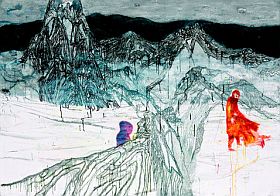
Daniel Richter: 10001 Nacht (2011)
Eller jeg kunne indstille mig på en oplevelse, som jeg husker fra Werner Herzogs Encounters At The End Of The World (2008) da endelig i mit hoved på den filmfestival fokus for mig flyttedes væk fra den tabte tid, og mit vemod forvandledes til en klaustrofobi sammen med dykkerne under Antarktis’ havis og en undren over naturforskningens galgenhumor (ja, der blev leet meget i salen) til simpel angst over, at det efter dinosaurernes uddøen så pludseligt som art dengang i fortiden nu er vores tur, for det mindede Herzogs alvor uden nåde og hans tydelige billeder af vore fremtidige ruiner mig om. Denne vældige, vrede mands stemme af fast beslutsomhed og overraskende, musikalsk indsigt med en essayistisk fortællekraft som de gamle rejsendes i samtaler med disse nye polarforskere og i den kritiske beretning om dem.
Men så er der i stedet ikke langt inde i Denciks film en kortfattet kvindestemme som Katrine Warsaaes med en pludselig og løsreven bemærkning med venlig og beskedent tilbageholdt pondus af viden om arters massedød tidligere i Jordens historie, men faktisk meget sjældent, med årmillioner imellem. Nu sker det måske igen, siger hun, en art er ved at uddø, denne gang ved at destruere sig selv, vi er måske midt i det.
Daniel Dencik har lavet en ung og opsætsig film med sine helte på rejse i et sejlskib frem mod verdens ende. Nu er navnene Jonas Bergsøe, Minik Rosing, Per Bak Jensen, Jeppe Møhl, Jens Fog Jensen, Tal R, Morten Rasch, Bo Elberling, Katrine Worsaae og altså Daniel Richter. De er om bord på skibet, de er ekspeditionens medlemmer, og de er filmens medvirkende, og små bidder af det, de siger til hinanden foran det observerende kamera, bliver efterhånden til filmens essayistiske udsagn.
I begyndelsen troede jeg ikke på, at det ville lykkes, temmelig skeptisk blev jeg hængende ved filmen, men ikke fanget. Jeg blev ikke på noget tidspunkt fanget, men filmen voksede og voksede for mine øjne og jeg noterede mig brudstykkerne af en eller anden redegørelse. Fra instruktøren? Fra klipperummet? Det er i hvert fald ikke så ligetil som hos Herzog – jeg må skrive det essay selv, hvis jeg vil have det i sprog. Hvor Herzog binder sin film sammen ved sin stemmes mesmeriserende indtrængen, er det i Denciks film sådan, at sammenbindingen er overladt til klipperen og juxtapositioneringerne og i sidste ende til tilskueren selv. Det filosofiske arbejde kommer til at foregå inde i mit hoved, så godt det nu kan lade sig gøre, som forhistorien, får jeg at vide et sted, ikke er lokaliseret omkring de artefakter, som arkæologen finder derinde på bredderne af den nordgrønlandske fjord, men i arkæologens hoved. Og først bliver til forhistorie, når han taler og skriver.
Så når jeg efter 188 minutter sidder med slutteksterne og læser navnene og fagene: geolog, maler, fotograf, kaptajn, zoolog og pilot, arkæolog, marinbiolog, geograf, filmfotograf, klipper, lyddesigner, producent (men vist ikke researcher og forfatter noget sted?) er jeg forvirret og skuffet, så mange har fra så forskellige positioner sagt noget og gjort noget, men hvem har skrevet filmen? Tre navne dækker sig ind ved siden af hinanden, men hvor er autor, hvem er ansvarlig?
Og så vender jeg tilbage til Kirkeby, er han ude for det samme med bogen om Lauge Koch?: ”Sådan falder de mange citater hist og pist. Det giver en falsk fornemmelse af objektivitet, af at lade kilderne tale for sig selv. Men det duer ikke, for der er jo truffet et valg og vi kender ikke udgangspunktet. Denne ”metode” giver netop ikke noget grundlag for selv at danne sig et billede, fordi der spilles med skjulte kort, måske har forfatterne ikke for alvor turdet danne sig deres eget billede. Og så har man som læser ikke noget at reagere mod, ikke nogen væg at spille op ad. Disse evindelige citatbrudstykker, som man oftest kommer i tvivl om hvor hører til, giver blot en usikker fornemmelse af at blive forholdt noget. Havde forfatterne skrevet deres fortælling, som de var berettiget til gennem det store researcharbejde (at have ’læst alle kilderne, alle dagbøgerne i deres fulde omfang’), så havde man kunne reagere med at det her klinger rigtigt, og det her tror jeg ikke på…”
“Det er måske ikke så slemt alt sammen”, nej, det er jo nok en rigtig god film med alle papirerne i orden og mange gensyn foran sig, og i hvert fald har jeg også mine helte relativt uberørte endnu. Men jeg er anbragt tankefuld og tvivlende.
Daniel Dencik: Ekspeditionen til verdens ende, Danmark 2013, 188 min. Manuskript: Michael Haslund-Christensen, Daniel Dencik og Janus Metz. Fotografi: Martin Munch, Torben Forsberg, Adam Philp og Valdemar Cold Winge Leisner. Klip: Per Sandholt og Rebekka Lønqvist. Musik: Mads Heldtberg. Lyddesign: Per Nyeström. Produktion: Michael Haslund-Christensen / Haslund Film. Premiere på onsdag 6. februar i en række biografer: http://www.doxbio.dk/dbio/b.lasso?ll=2s
Litt.: Per Kirkeby: Ekspeditionerne i Fisters klumme (1995). Kito Nedo, Anders Kold og Susanne Figner: 10001 Nacht, katalog til Daniel Richter udstilling, Kestner Gesellschaft, Hannover (2011)



